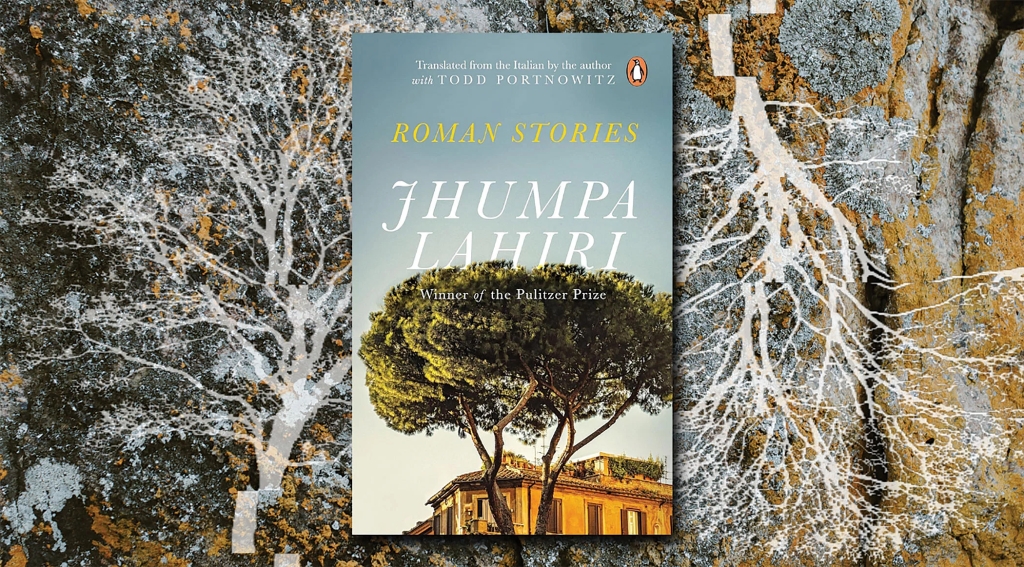Started off 2024 with a pledge to read one book every week, and happened to pick Jhumpa Lahiri’s Roman Stories as my first pick. Very soon I came to the realisation that I might have put an unrealistic clock on my reading time.
The thing is, some books do not need an hourglass reminder for you to speed through them. Some books are like stretching after sitting in an uncomfortable position for a long time. You need to take your time with them. A little haste, and you don’t know where you might end up getting hurt.

About the Book
Written by Pulitzer Prize winning author Jhumpa Lahiri, ‘Roman Stories’ is a collection of short stories of and about people exploring the meaning of home. Written originally in her adopted language of Italian, these stories have been translated by her and Knopf editor Todd Portnowitz. The stories revolve around people of varied backgrounds and ethnicities living under the same sky but going to bed with different stars in their eyes.
My Thoughts
This book of short stories turned out to be a heavy read. With nine short stories, distributed in three parts, it took me a little over two-weeks to get through it. But at the end it was all worth it. The stories are heart warming and heart wrenching at the same time. Most stories revolving around first generation immigrants, who have come to the city from far off countries and even years later, are struggling to figure out the true meaning of home, and the cost of exile.
Lahiri self-translated six out of the nine stories, entrusting editor Todd Portnowitz with the remaining three. The translation is supple and elegant throughout; sentences gleam and flow, adding to the vividness and immediacy of these tales about buried grief, belonging and unbelonging.
The characters, always unnamed, are often sick and mostly homesick; they worry about their bodies, reminisce about past homes and past lives. Sometimes a parent, a friend or a child is remembered or mourned; and there is always, a degree of guilt involved. Lahiri deals with hard hitting realities of discrimination against people of different ethnicities in many different ways. She writes about the city of Rome fondly, telling the readers of its beauty and splendour. At the same time letting us know that the beauty of the city did not welcome everyone, with the mention of xenophobic slurs graffitied across walls on various aspects. She speaks of the people of Rome with great love and remembrance, at the same time, reminding us of their flaws when she tells about people of colour being called ‘dirty’ or simply being shot in jest.
During the celebrations of La Festa de Noantri, depicted in “The Procession,” a couple arrives in Rome to mark the wife’s 50th birthday. Rome holds a significant place in her heart, as it was where she spent a formative year at 19, falling in love for the first time. However, tranquility proves elusive during their visit, with unsettling occurrences accumulating: the startling morning light, a precarious chandelier, slamming French doors, a stubbornly locked room, and another room reminiscent of an operating theater, evoking memories of a deceased son.
In “The Boundary,” a girl and her family move to the countryside near Rome following a racist attack on her immigrant father in the city. She finds solace in observing a group of vacationers in the neighboring house, a coping mechanism for her loneliness and her father’s altered state after the trauma. Describing her father, the girl notes “He garbles his words, as if he were an old man,” the girl says. “He’s ashamed to smile, because of his missing teeth. My mother and I understand him, but others don’t. They think, since he’s a foreigner, that he doesn’t speak the language. Sometimes they even think he’s mute.”
In ‘The Delivery,’ a young woman of colour walks home after retrieving a package for her employer from the post office, only to be shot at point-blank range by a man on a scooter who shouts derogatory remarks about her appearance before speeding away. The terms ‘dirty’ and ‘ugly’ resonate with racist connotations in ‘Notes‘ and ‘The Reentry,’ two narratives that emphasise the callousness of young children and the apathy of unsympathetic adults.
Out of the nine beautifully written and translated stories, the one that hit my heart strings was “Well Lit House” in which a war refugee struggles to withstand the targeted hostility of his neighbors. As the story unfolds, he and his family are ultimately forced out of their apartment. He finds himself homeless, sleeping on the streets, while his wife chooses to return to their homeland with their children. The ending is beautifully decorated with tragic metaphors.
What Makes it a Must Read?
Lahiri is better known for her literary focus rather than political commentary. She once stated in an interview, ‘I’m trying to create people of all kinds and put them into situations, and it’s not my objective to have a message.’
However, throughout the stories of this book, one can feel the underlying frustration of the author who is deeply troubled by the plight of immigrants in Italy. The narrative captures the anti-immigrant rhetoric of Italy’s people, the fervent nativism, the tragedies of sunken dinghies in the Mediterranean, and the prevalent casual Islamophobia and Afrophobia among Italians, all portrayed with raw, unflinching honesty
Leave a comment